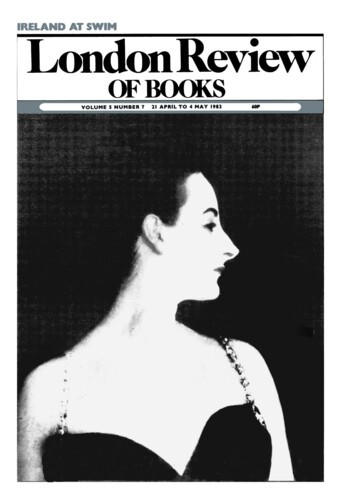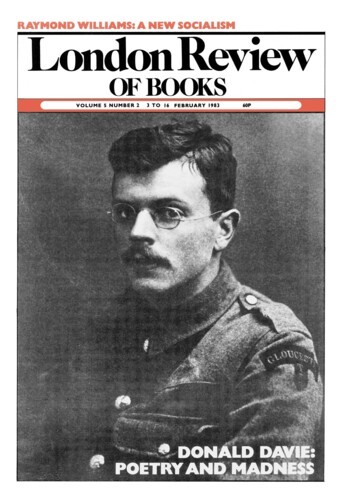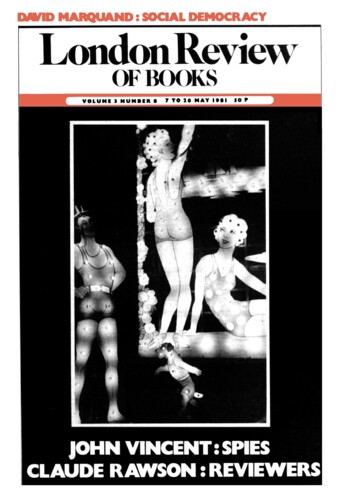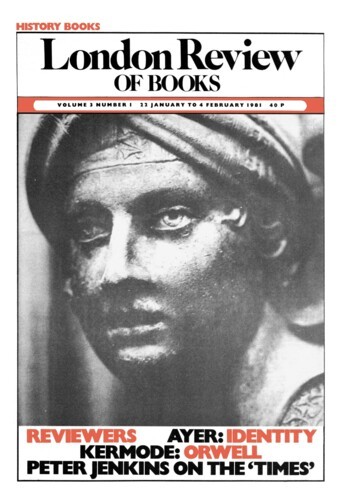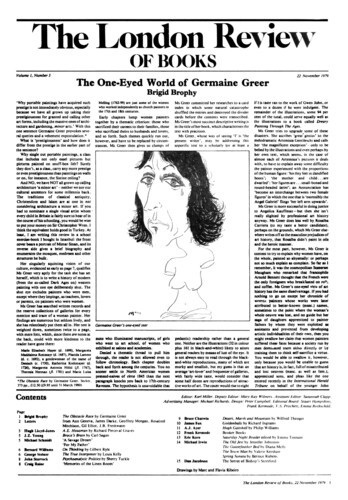Craig Raine
Craig Raine’s My Grandmother’s Glass Eye: A Look at Poetry will be published in December.
Everybody
Craig Raine, 3 February 1983
Confessions of an Actor is, unsurprisingly, more an impersonation than a real piece of writing. In it, Laurence Olivier acts writing – an uneasy mixture of the chatty (‘All right, I can hear you, reader dear’) and the belle-lettrist flourish (‘Fortunately for the restoration of my depleted coffers … ’). What good bits of writing there are (not many) stem equally from Olivier’s métier: as when, for instance, he arrives in Hollywood to help the mad Vivien Leigh. ‘I said, “Hello, darling,” and when she spoke to me it was in the tone of halting dreamlike amazement that people in the theatre use for mad scenes when they can’t think of anything better. My instinctive reaction was that she was putting it on.’ She wasn’t. Soon she had to be sedated: ‘To my horror I saw that the nurse was enjoying it; she was waggling the syringe and there was a glint in her eye. But there was no time for anything; Danny Kaye and I threw ourselves on top of Vivien and held her down. Vivien fought us with the utmost ferocity as the needle went in, biting and scratching Danny and me, screaming appalling abuse at both of us, with particular attention to my erotic impulses … ’ There is a professional, unadorned quality of observation here that survives the sentence’s limp end: ‘it seemed an eternity before she went limp and Danny and I were able to let her go, both shattered and exhausted.’ The whole incident shows us not only the distraught husband but also the observant actor. Indeed, in Olivier’s life, the professional, for the most part, took priority over the personal: ‘I have always believed that if you aspire to be an artist you must be prepared to make such personal sacrifices as separation readily, if not exactly cheerfully. It’s tough but it’s right.’
Poem: ‘The Widower’
Craig Raine, 7 May 1981
His wet waders dipped in lacquer by the light,
the lobsterman puts out to sea against the tide
that tilts his boat. From where we stand, up on the dunes,
his wicker pots have dwindled already to balls of twine,
but for five minutes, saluting the sun out of our eyes,
we watch him knit with clumsy oars, while the waves
unravel their length, this way, that way, on the beach below ...
Have we...
Poem: ‘A Free Translation’
Craig Raine, 22 January 1981
(for Norma Kitson)
Seeing the pagoda of dirty dinner plates, I observe my hands
under the kitchen tap as it they belonged to Marco Polo:
glib with soap, they speak of details from a pillow book,
the fifty-seven ways in which the Yin receives the Yang.
Rinsed and purified, they flick off drops like a court magician
whose stretching fingers seek to hypnotise the helpless house ...
This single...
Poem: ‘Memories of the Linen Room’
Craig Raine, 22 November 1979
‘Fetch me the handkerchief; my mind misgives …’
Othello (III, iv, 89)
In the dormitory, boys laced up their rugby boots like parcels,
knowing the mud outside would add that final touch of scaling wax.
It’s taken them twenty years to be delivered by an accident:
I see a pint of gritty mussels for sale and think of wet boots
on the changing-room floor. The...
Pieces about Craig Raine in the LRB
Count the Commas: Craig Raine’s novel
Terry Eagleton, 24 June 2010
Craig Raine’s Heartbreak is a novel in the sense in which Eton is a school near Slough. The description is true but misleading. It is really a collection of short stories, loosely linked by...
Is it always my fault? T.S. Eliot
Denis Donoghue, 25 January 2007
In 1929, in his essay on Dante, T.S. Eliot wrote: But the question of what Dante ‘believed’ is always relevant. It would not matter, if the world were divided between those persons...
Yoked together
Frank Kermode, 22 September 1994
‘There is hardly a stanza in the long poem which is not vivid, hardly one which is not more or less odd, and the reader feels ... as if he had been riding on the rims over an endless timber...
Being all right, and being wrong
Barbara Everett, 12 July 1990
Men of different generations and presumably social worlds, Anthony Powell and Craig Raine aren’t much alike as writers. But the novelist’s Miscellaneous Verdicts and the poet’s
Puck’s Dream
Mark Ford, 14 June 1990
D.J. Enright recently celebrated his 70th birthday. In commemoration, Oxford University Press have prepared a rather lean Selected Poems, and a volume of personal reminiscences and critical...
Insupportable
John Bayley, 19 February 1987
Charlie Chaplin was not hopeful when the talkies arrived in Hollywood. ‘It would mean giving up my tramp character entirely. Some people suggested that the tramp might talk. This was...
Tales of Hofmann
Blake Morrison, 20 November 1986
The acrimony in Michael Hofmann’s book is that of a son towards his father. Like a family photograph album, the sequence ‘My Father’s House’ records the son’s growth...
Sweaney Peregraine
Paul Muldoon, 1 November 1984
The title-sequence of Seamus Heaney’s sixth collection finds him on Station Island, Lough Derg, more commonly known as St Patrick’s Purgatory. It’s the setting for a pilgrimage...
Best Things
Alan Hollinghurst, 20 August 1981
By and large we are interested in the thoughts, opinions and intentions of writers we are interested in, and by and large writers are keen to express these things in reviews, essays and memoirs...
A Martian School of two or more
James Fenton, 6 December 1979
Craig Raine’s second collection follows swiftly upon his first, The Onion, Memory (1978). It is as if the poet had been waiting impatiently over us, while we picked ourselves up off the...
Read anywhere with the London Review of Books app, available now from the App Store for Apple devices, Google Play for Android devices and Amazon for your Kindle Fire.
Sign up to our newsletter
For highlights from the latest issue, our archive and the blog, as well as news, events and exclusive promotions.
